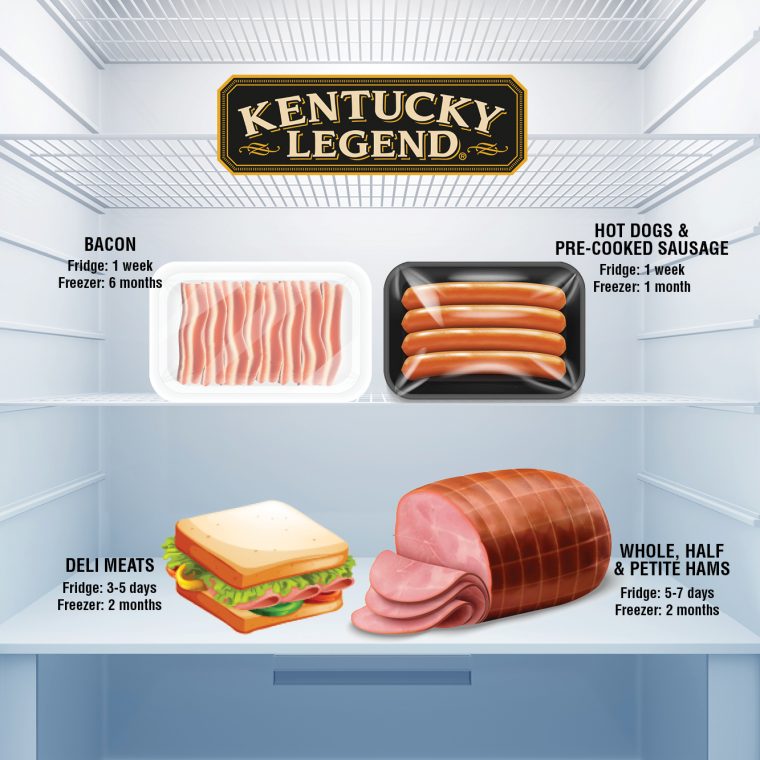Deli meat typically lasts for 3-5 days in the refrigerator. Factors like storage conditions can affect freshness.
Are you a fan of deli meat but unsure how long it lasts? Understanding the shelf life of deli meat is crucial for maintaining food safety and quality. In this blog, we’ll delve into the factors that impact the longevity of deli meat, storage tips to prolong its freshness, and signs that indicate it’s time to discard your deli meat.
Let’s ensure you enjoy your favorite cold cuts at their best while minimizing food waste and the risk of foodborne illnesses. Stay tuned for expert advice on handling deli meat like a pro!

Credit: www.youtube.com
Freshness Factors For Deli Meats
When it comes to deli meats, ensuring freshness is crucial for both taste and safety. Understanding the freshness factors can help you make informed decisions about the quality and shelf life of your deli meats. From preservation methods to the different types of deli meats available, here’s what you need to know:
Preservation Methods
Preserving deli meats is essential to maintain their freshness and prevent spoilage. Here are some common preservation methods used:
- Refrigeration: Deli meats are typically stored in refrigerated environments to slow down bacterial growth and maintain their quality.
- Vacuum sealing: This method involves removing air from the packaging to create a vacuum seal, which helps to preserve the deli meats for a longer period.
- Curing: Some deli meats, such as cured ham or salami, undergo a curing process where they are treated with salt, spices, and other preservatives to enhance flavor and extend shelf life.
Types Of Deli Meats
How Long Does Deli Meat Last? There are various types of deli meats available, each with its own unique characteristics and freshness considerations. Here are a few popular types:
| Type | Description | Freshness |
|---|---|---|
| Roast Beef | Lean, thinly sliced beef that is often cooked and seasoned for use in sandwiches or salads. | Best consumed within 3-5 days of purchase when stored properly. |
| Turkey Breast | Delicate and lean meat that is a healthier alternative to other deli meats. | Usually stays fresh for about 5-7 days when refrigerated below 40°F. |
| Pastrami | A highly seasoned and smoked beef product that is typically served hot. | Can be refrigerated for up to 2 weeks if stored in an airtight container. |
Remember, these are general guidelines, and the freshness of deli meats can vary depending on factors such as storage conditions and quality of the product. Always check for any signs of spoilage, such as an off odor or slimy texture, before consuming deli meats.
The Shelf Life Of Packaged Vs. Sliced Deli Meats
When it comes to deli meats, understanding their shelf life is essential for ensuring food safety and quality. The shelf life of deli meats can vary depending on whether they are pre-packaged or freshly sliced. Let’s explore the nuances of each to help you make informed decisions about your deli meat purchases.
Pre-packaged Deli Meat Nuances
Pre-packaged deli meats typically have a longer shelf life compared to freshly sliced deli meats. The packaging of these meats is designed to provide an extended period of freshness and preservation. However, it’s important to check the expiration date and storage guidelines on the packaging to ensure the meat remains safe to consume.
Freshly Sliced Deli Meat Dynamics
When it comes to freshly sliced deli meats, their shelf life is generally shorter due to the absence of preservatives found in pre-packaged varieties. These meats are often cut to order, emphasizing freshness but requiring more immediate consumption. Proper refrigeration and adherence to recommended storage practices are crucial for maintaining the quality and safety of freshly sliced deli meats.
Signs Of Spoilage In Deli Meats
Deli meats typically last 3-5 days in the refrigerator. Signs of spoilage include a sour smell, slimy texture, or unusual discoloration. Always check for these indicators before consuming deli meats to ensure freshness and safety.
When it comes to deli meats, freshness is key for both taste and safety. Understanding the signs of spoilage in deli meats can help you avoid consuming potentially harmful food. Here are the visual clues and olfactory indicators to look out for:
Visual Clues
Visual inspection is an important step in determining the freshness of deli meats. Here are some visual clues that may indicate spoilage:
- Discoloration: Check for any changes in the color of the meat. If the meat appears gray or has green or black spots, it is likely spoiled.
- Texture changes: Fresh deli meats have a moist and firm texture. If you notice any sliminess, excessive dryness, or a sticky surface, it may indicate spoilage.
- Mold growth: Mold growth is a definite sign of spoilage. If you see any fuzzy patches or mold on the deli meat, it should be discarded immediately.
Olfactory Indicators
Smell can be a powerful indicator of spoilage in deli meats. Here are some olfactory indicators to be aware of:
- Foul odor: Fresh deli meats have a mild, meaty smell. If you detect a strong, unpleasant odor such as a sour or ammonia-like smell, it is likely spoiled.
- Offensive or rancid smell: If the deli meat has a strong, offensive smell or smells rancid, it is a clear sign of spoilage.
When it comes to deli meats, it is important to trust your senses. If you notice any of these visual clues or olfactory indicators, it is best to err on the side of caution and discard the meat. Consuming spoiled deli meats can lead to foodborne illnesses, so it is crucial to prioritize food safety.
Optimal Storage Practices
When it comes to deli meat, proper storage is key to maintaining its quality and safety. Optimal storage practices help to ensure that your deli meat stays fresh and free from harmful bacteria. By following simple guidelines for refrigeration, freezing, and thawing, you can prolong the shelf life of your deli meat and enjoy it safely.
Refrigeration Tips
Keep deli meat refrigerated at a temperature below 40°F (4°C) to slow bacterial growth. Store deli meat in its original packaging or reseal it in an airtight container to prevent exposure to air and moisture. Consume within 3-5 days of opening for best quality.
Freezing And Thawing Guidelines
If you want to extend the shelf life of deli meat, freezing is an excellent option. Before freezing, divide the deli meat into portion sizes for convenience. Wrap it tightly in plastic wrap or aluminum foil, then place it in a freezer-safe bag or container. Label with the date to track its freshness.
The Role Of Preservatives
Preservatives play a crucial role in extending the shelf life of deli meat, ensuring that it remains safe to consume for an extended period. They help to prevent the growth of harmful bacteria, mold, and yeast, which can lead to spoilage and potential health risks. Understanding the different types of preservatives and their impact on the shelf life of deli meat is essential for making informed choices about food safety and storage.
Natural Vs. Artificial Preservatives
When it comes to preserving deli meat, both natural and artificial preservatives are commonly used. Natural preservatives, such as salt and vinegar, have been used for centuries to prevent spoilage. These preservatives work by creating an environment that inhibits the growth of bacteria and other microorganisms. On the other hand, artificial preservatives, like sodium nitrate and sodium nitrite, are chemically synthesized compounds that also inhibit the growth of bacteria and enhance the color and flavor of deli meat.
Impact On Shelf Life
The type of preservative used in deli meat has a significant impact on its shelf life. Natural preservatives, although effective, may have a shorter shelf life compared to artificial preservatives. This is because natural preservatives may not provide the same level of protection against bacterial growth. Additionally, factors such as packaging and storage conditions can influence the overall shelf life of deli meat. It is important to follow proper storage guidelines, including refrigeration and proper packaging, to maximize the freshness and safety of deli meat.
Moreover, it is worth noting that consuming excessive amounts of artificial preservatives may have potential health risks. Some studies have suggested a link between high intake of sodium nitrate and an increased risk of certain health conditions. Therefore, it is advisable to consume deli meat in moderation and opt for products that use natural preservatives or reduced levels of artificial preservatives.
Safety Tips For Handling Deli Meats
When it comes to enjoying deli meats, it’s important to be mindful of proper safety tips for handling them. By following best practices, you can ensure the longevity and safety of your deli meats, keeping them fresh and delicious for longer periods.
Hygienic Handling
Wash your hands thoroughly with soap and water before and after handling deli meats to prevent the spread of bacteria. Always use clean utensils and cutting boards, and avoid touching your face while working with deli meats to minimize the risk of contamination.
Cross-contamination Prevention
Store deli meats separately from other foods, especially raw items like poultry or seafood, to prevent cross-contamination. Use separate cutting boards and utensils for deli meats to avoid transferring harmful bacteria. Clean and sanitize all surfaces and equipment that come into contact with deli meats.
Maximizing Freshness After Purchase
After purchasing deli meat, proper handling is crucial to maintain its freshness and quality. By following some simple tips, you can extend the shelf life of your deli meat and enjoy it for longer.
Repackaging For Longevity
Transfer deli meat to airtight containers to prevent exposure to air and moisture.
Portioning Strategies
- Divide deli meat into smaller portions to only defrost what you need.
- Label each portion with the date to track freshness.
- Store portions in the freezer for extended shelf life.
The Debate: Taste Vs. Freshness Duration
When it comes to deli meat, a common debate arises between taste and freshness duration. Balancing the desire for flavor with the need for safety is crucial.
Flavor Preservation Techniques
Various methods aid in preserving the flavor of deli meat. These include vacuum sealing and proper temperature control.
Trade-offs Of Extended Shelf Life
Extending the shelf life of deli meat may impact its taste. However, it allows for greater convenience and reduced waste.

Credit: www.unipatch.com
Frequently Asked Questions
How Long Can Deli Meat Last In The Fridge?
Deli meat can last up to 5 days in the fridge if stored properly. It’s important to keep it in an airtight container or wrapped tightly in plastic wrap to prevent it from drying out or absorbing moisture.
Can You Freeze Deli Meat?
Yes, deli meat can be frozen for up to 2 months. It’s best to wrap it tightly in plastic wrap or aluminum foil before placing it in a freezer-safe bag or container. Thaw it in the fridge for several hours before using.
How Can You Tell If Deli Meat Has Gone Bad?
If deli meat has a sour or off smell, slimy texture, or a grayish color, it has gone bad and should be discarded immediately. It’s important to always check the expiration date and use-by dates before consuming deli meat.
Conclusion
Knowing how long deli meat lasts is crucial for your health. It is recommended to consume it within three to five days after purchase and to store it properly. Always check for any signs of spoilage before consuming it. By following these guidelines, you can minimize the risk of foodborne illnesses and enjoy your deli meat safely.
So, be mindful of the expiry date and make sure to consume it before it goes bad.


